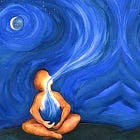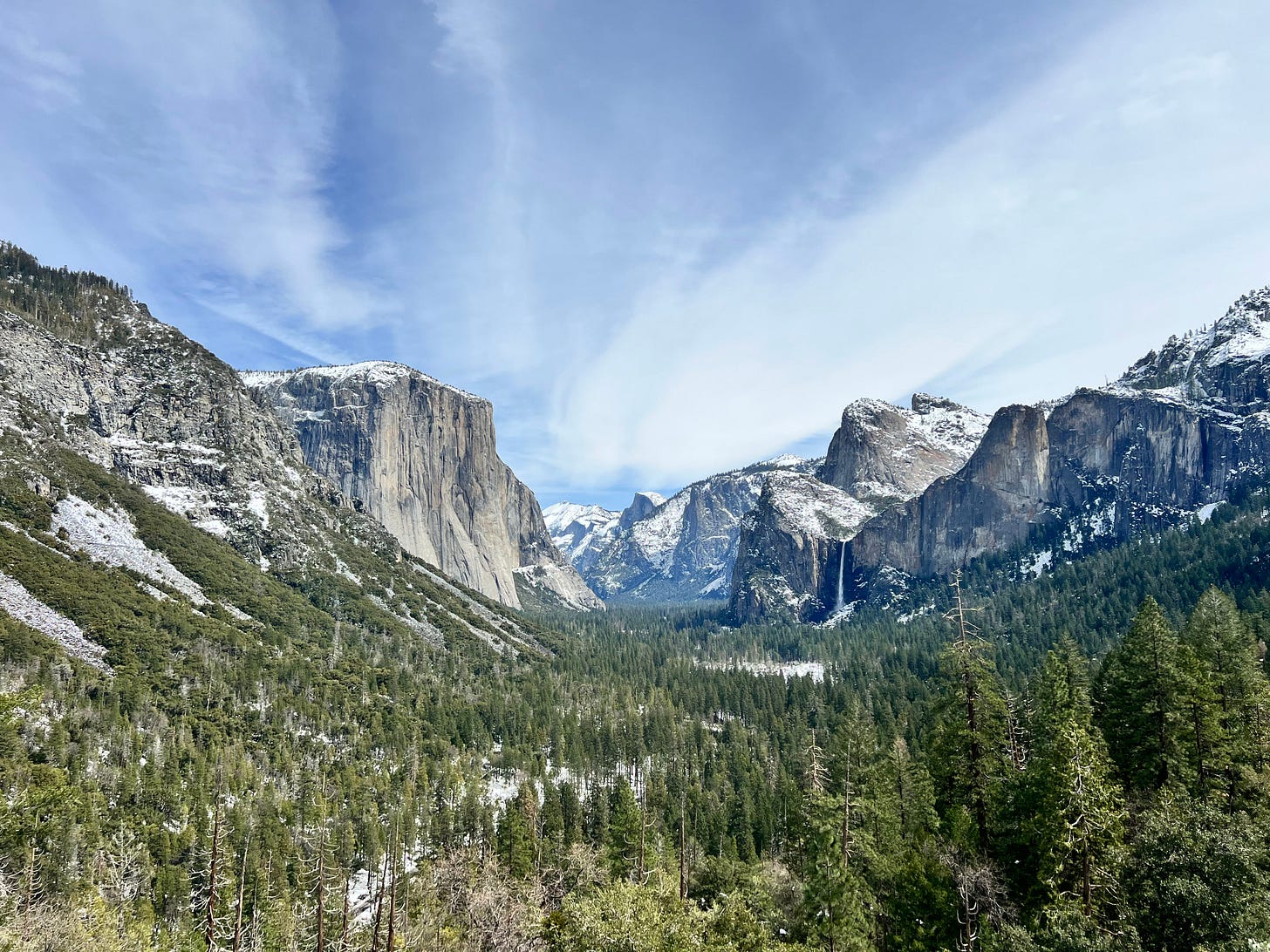I have a challenge for you. For 10 days of your life, could you just sit down and shut up?
I guess the polite term for this is “going on a meditation retreat,” but no matter what we call it, for most people, the answer is an easy no. It sounds like cruel and unusual punishment.
But if you happen to be the same kind of weird as me, you might actually be into sitting down and shutting up—going on a retreat. I say this after just having come back from my second 10-day Vipassana retreat. And because I just spent the last 10 days in complete silence, I’m a little unable to shut up about it.
Why would you do such a thing?
In spring 2023, I attended a Vipassana course near Joshua Tree, but this time, I went to a center in the mountains south of Yosemite. As my car wound up the mountain roads, I sensed the cool, thin air and tall trees. My heart was beating a little faster than usual. Wait, why am I doing this again?
The reasons for going on a retreat might seem opaque to most people. Most people don’t meditate, and most meditators sit for a few minutes a day. But the more one does it, the more the benefits stretch beyond simple stress relief. Meditation helps dissolve the apparent boundary between self and other, encouraging more selfless service, which benefits everyone.
For that reason, I’m in a chapter of my life where I want to spend as much time on the cushion as possible, because I’ve seen the benefits—not just for myself, but for others. If 30 minutes per day could help me drastically, how much more might 10 hours per day, for 10 days straight?
This retreat program, which is technically Vipassana meditation as taught by S.N. Goenka, also has the profoundly rare quality of being fully donation-based. Meditators are actually prohibited from donating until the end of the course, so that their retreat is funded as a gift from past students. Even then, there’s just a simple pay-what-you-wish table. Nobody pressures you.
Also, if you’d like to learn how to practice Vipassana without attending a 10-day course, you can do so here:
But what’s the catch?
Going on a 10-day retreat can be deeply, profoundly boring. That might not be a bad thing.
You might not know, but the past several months have been especially, uh, newsworthy. I, like most people, felt every last neuron in my brain wither and die after consuming a never-ending stream of the most horrible news of my lifetime. I knew it wasn’t good for me. But when the retreat began, I felt the withdrawal viscerally, like someone quitting heroin cold turkey.
Every day was exactly the same: wake up, sit, eat, sit, eat, sit, sleep, repeat. There was no talking—did I mention that yet?—no reading, no news, no music, no nothing. Just this. Going to bed at 9:30, I felt a little forlorn thinking about my nighttime music and bedtime snack.
And yet, with time, my mind and body began to attune to a different kind of sound. I began to appreciate the gentle music of wind in the pine trees. Even my thoughts became less noisy. An inner silence and stillness started to emerge.
Has anything changed?
Despite the monotony, the retreat gave me some real insights.
One was my newfound appreciation for simple mindfulness of breath. Before the retreat, I had been somewhat dismissive of it. I may have mild asthma, and focusing on my breathing sometimes made me more anxious about whether I was breathing “correctly.” But after three days of nothing but breath awareness, I started to let go of that. I stopped trying to control my breath and instead just let it happen. Over time, I didn’t even need to manually bring my attention back to it—it would return on its own. I found a real sense of peace in that.
I also had a lot of insight into craving and aversion—how they structure perception and action. A core teaching in Vipassana is that suffering arises from wanting things to be other than they are. That wanting takes two forms: craving for something that isn’t here and aversion to something that is.
From day four onward, we practiced observing bodily sensations and our reactions to them—whether we were reacting with craving for pleasant sensations or aversion to unpleasant ones. The more I did this, the more I started seeing the same patterns everywhere.
I saw it in how I reacted to time—sometimes resenting having too much of it, other times craving more rest. I saw it in eating—certain ingredients I instinctively avoided even though they were fine, certain ingredients I craved but didn’t need to eat that much of. (Spoiler alert: peanut butter.)
The way out of craving and aversion is equanimity. Not indifference, but balance. Equanimity is also non-reactivity, because one who abides in equanimity refrains from craving and aversion and the reactivity they engender. I actually found Vipassana’s emphasis on equanimity shockingly resonant with my past essay on balance, which you can read here:
Okay, but who am I?
Coming back has been an adjustment. It’s been four days, and I still feel like I’m putting myself back together.
One of the core insights in Buddhism is that there is no self—no solid, unchanging "me" at the center of experience. I had conceptually understood that before (see my essay on it below) but coming out of the retreat, I felt it in a deeper way.
For ten days, I let go of the little things that reinforce identity—no ruminating on the past, no planning the future, no comparing myself to others. I just followed the schedule. And when the retreat ended, I got in my car, and I expected to feel like myself again. But I wasn’t sure who that was.
It felt like no one was sitting in the car. Or maybe like many people were sitting in the car.
I could see different parts of myself arising: the part that wanted to listen to The Beatles, the part that wanted Charli XCX. The part that wanted to drive straight home, the part that wanted to stay another day in Yosemite. Eventually, I made a choice. I listened to The Beatles and stayed in Yosemite. But I can’t say there was some central “I” that made that decision. It was just that one set of impulses had more influence in that moment.
Since coming back, I’ve been watching that play out. The compulsions are still there—to check certain feeds, to seek out distractions—but they feel weaker. Less urgent. I still feel motivated to do things, but I also feel less of a desire to act on unnecessary impulses. I don’t know who I am right now. That might also be a good thing.
Should you do a retreat?
If you’re even asking, I think the answer is yes.
It’s not for everyone. It attracts a certain kind of person—someone introspective, curious, maybe a little extreme. But if you feel drawn to it, there’s probably a reason.
I won’t say it’s easy. At some point, difficult emotions will probably come up. But honestly, a retreat is one of the best places for that to happen. You have no one to lash out at, no responsibilities to stress over. You’re in a physically contained, beautiful setting.
And if ten days feels like too much? Start smaller. One-day retreats, weekend retreats—there are plenty of options.
It’s hard to say exactly what you’ll get out of it. But if my experience is any indication, it might shift something in you.
If you could just sit down and shut up, then you could find yourself.
Or lose yourself.









Just reread this, now that Spring Retreat (which I'm greatly looking forward to) is only a couple of days away! Not sure about a 10 day retreat anytime soon. It would be difficult re: leaving my spouse with double the work at home (including a dog and 3 cats) for that long, but if I truly feel called at some point, I'm sure we'd work it out.